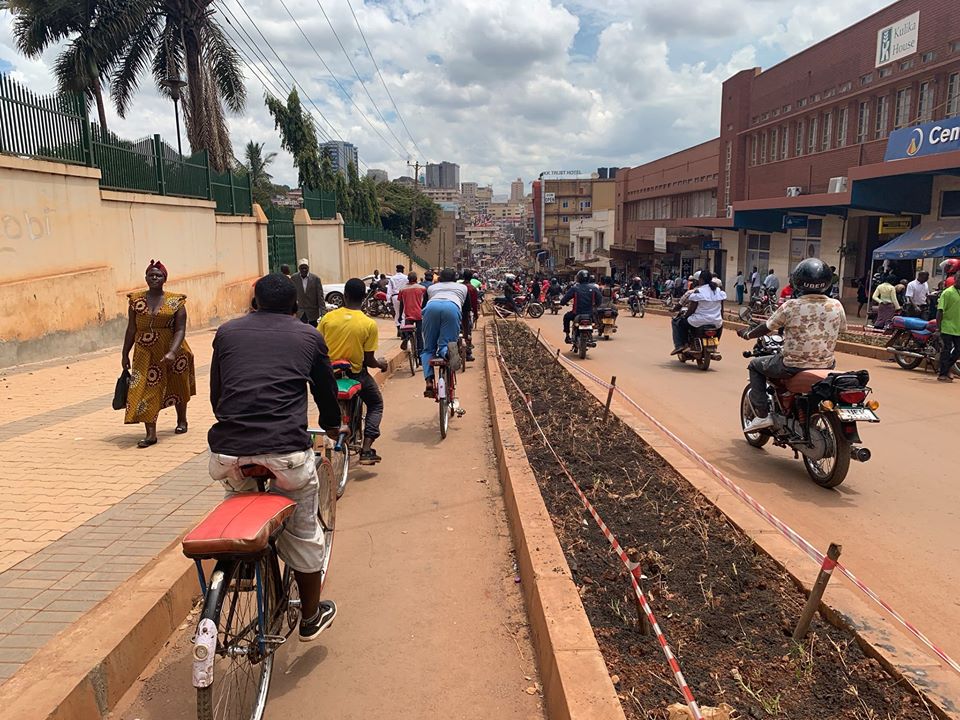Amsterdam, June 3rd 2020
Today, on the UN’s World Bicycle Day 2020, BYCS and its network of Bicycle Mayors & Leaders are launching a Global Call to Action to Champion Active Mobility post COVID-19.
There has been an extraordinary uptake of cycling in cities worldwide due to urban movement restrictions related to the COVID-19 pandemic. This unprecedented global health emergency has also triggered the fastest transformation of city space in modern history to benefit pedestrians and cyclists. Putting active mobility first will ensure safe, appropriately distanced access to vital public spaces. It also provides a solution to the short-term decrease in public transport use and the potential increase in private automobiles as movement restrictions ease. Importantly, prioritising active mobility will help to reduce carbon emissions and pollution in cities.
It is crucial that the current policies aimed at facilitating cycling extend well into the recovery period and jumpstart a permanent shift towards human-centric cities where pedestrians and cyclists are placed at the top of mobility hierarchies. The World Health Organization (WHO) recognizes that improved active transportation is a pathway for achieving greater socio-economic and health equity, increased community engagement, environmental awareness and a positive impact on climate. To ensure this shift, it is necessary for civil society to have a voice on this issue and hold governments accountable. The bicycle is a simple, affordable, reliable and environmentally fit tool that has the capacity to remedy deeply entrenched social ills that have been made more evident than ever during this pandemic.
On this important day, 70 members from 31 countries of BYCS’ Global Bicycle Mayor & Leader Network are issuing a joint call for local governments across the world to put the health and wellbeing of all citizens first and adhere to the following actions:
- Facilitate and extend temporary “Light Individual Transport” lanes across key urban corridors, and commit to permanent, protected infrastructure.
- Increase the provision of public space for outdoor activity, especially in neighborhoods without open spaces, to mitigate harmful physical and mental health effects.
- Accelerate existing programs aimed at improving active mobility and implementing traffic-calmed streets at the neighborhood level as well as policies designed to reduce urban car use.
- Develop programs and policies aimed at strengthening “Human Infrastructure” to facilitate an inclusive uptake of cycling and the development of a “culture of the bicycle”, such as bike purchases and repair subsidies, funding for local advocacy groups, and citizen training on how to cycle and increase confidence on the road, with an emphasis on children and communities historically excluded from cycling investments.
- Establish an international cooperative framework to share knowledge and best practices for the implementation of measures directed at improving cycling and walking.
- Implement more rigorous participatory tools for citizens to have a say on active mobility and access to public space, including surveys, forums and digital democracy tools.
To support our Call to Action, people around the world are encouraged to share this unified call on #WorldBicycleDay
Citizens: Find out what your local Bicycle Mayor is doing and get involved in their work. If your city does not have a Bicycle Mayor, then help BYCS to find one. Take a look at the full list of Bicycle Mayors and more info on how to elect one here.
City leaders and planners: Commit to or continue implementing these principles that prioritise active mobility in your cities. For inspiration and ideas on how to start transforming your city connect with BYCS through www.bycs.org
Notes to editors:
Contacts
Lucas Snaije
Research & Communications
lucas@bycs.org
+33 6 02 09 19 18
Maud de Vries
Co-founder & CEO
maud@bycs.org
+31 651 492 843
BYCS
BYCS is an Amsterdam-based social enterprise driven by the belief that bicycles transform cities and cities transform the world. Our mission is called 50by30: 50% of all trips by bicycle by 2030. It demands the brightest ideas and the most determined action. And we believe it will lead to a fundamental increase in health, happiness and prosperity for all. We work towards 50by30 through initiating, testing and scaling breakthrough ideas around cycling. We invest our profits into managing the global Bicycle Mayor program. In all our work, we always ask – ‘where can the bicycle take us?’
The Global Bicycle Mayor & Leaders Network
The Bicycle Mayor & Leader Network is a global movement of city catalysts. Members identify and lead projects that can make the biggest impact for cycling in cities, and unite everyone to take action. Bicycle Mayors act according to local need but with the support of the energy and ideas from the global network. The group is motivated by the way that increased cycling radically improves physical and mental health, as well as addresses systemic city challenges around air pollution, community cohesion and climate change. There are currently 100 mayors in 35 countries.
World Bicycle Day:
Acknowledging the uniqueness, longevity and versatility of the bicycle, which has been in use for two centuries, and that it is a simple, affordable, reliable, clean and environmentally fit and sustainable means of transportation, fostering environmental stewardship and health, the General Assembly decided to declare 3 June World Bicycle Day in 2018.
It encouraged stakeholders to emphasize and advance the use of the bicycle as a means of fostering sustainable development, strengthening education, including physical education, for children and young people, promoting health, preventing disease, promoting tolerance, mutual understanding and respect and facilitating social inclusion and a culture of peace.
Signed & endorsed by members of the Global Bicycle Mayor Network:
Jillian Banfield
Halifax, Canada
Shelley Carr
London, Canada
Susan Stokhof
Victoria, Canada
Arcy Canumay
Waterloo, Canada
Holly Pendergast
Austin, United States of America
David Gómez Murillom
San José, Costa Rica
Josafat Martínez de Luna
Aguascalientes, Mexico
Aréli Carreon
Mexico City, Mexico
Ricardo Bravo
Tulancingo, Mexico
Juventino Quiroz
Panama City, Panama
Ylenia Gonzalez Castillo
San Juan, Puerto Rico
Jimena Pérez Marchetta
Salta, Argentina
Mariana Salvador
Santa Fe, Argentina
Ana Carboni
Niterói. Brazil
Pablo Nieto
Bogota, Colombia
Ricardo Camacho
La Libertad, Ecuador
Eduardo Becerra
Cusco, Peru
Javier Flores
Lima, Peru
Marina Kyriakou
Nicosia, Cyprus
Adam Tranter
Coventry, England
Richard Ingham
Cumbria, England
Andreas Mueller
Witten, Germany
Spiros Papageorgiou
Athens, Greece
Donna Cooney
Dublin, Ireland
Marcel Kleizen
Den Haag, Netherlands
Tiago Neves
Barreiro, Portugal
Mario Meireles
Braga, Portugal
Alexandru Tomescu
Bucharest, Romania
Janez Stariha
Ljubljana, Slovenia
Jaime Novo Casado
Madrid, Spain
Mpaphi Ndubo
Gaborone, Botswana
Felix John
Chennai, India
G.Raghul Kumaran
Erode, India
Manish Jhatakia
Gondal, India
Arshel Akter
Guwahati, India
Sourav Chattopadhyay
Howrah, India
Klaudio Hyseni
Durrës, Albania
Pooja Vijay
Jaipur-Rajasthan, India
Prashant Tanna
Jamnagar, India
Firoza Suresh
Mumbai, India
Siddharth Shah
Navsari, India
Ashik Jain
Pimpri-Chinchwad. India
Divyesh Aghera
Rajkot. India
Yougal Tak
Udaipur, India
Natheer Halawani
Tripoli. Lebanon
Katelijne Boarma,
Amsterdam,
Netherlands
Tomas Couvry,
Paris, France
Pawan Dhingra
Ludhiana India
Prakash P Gopinath,
Thiruvananthapuram, India
Diego Puente Corral
Quito, Ecuador

